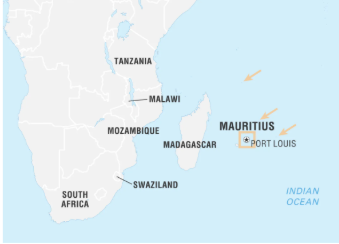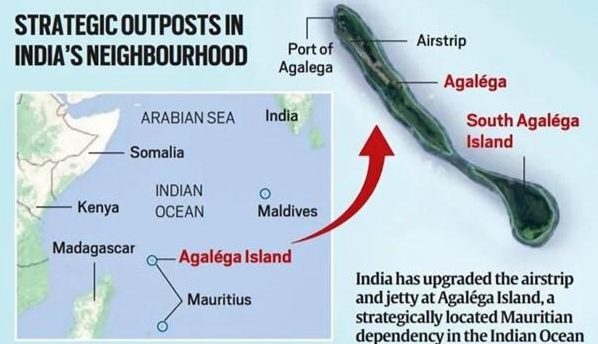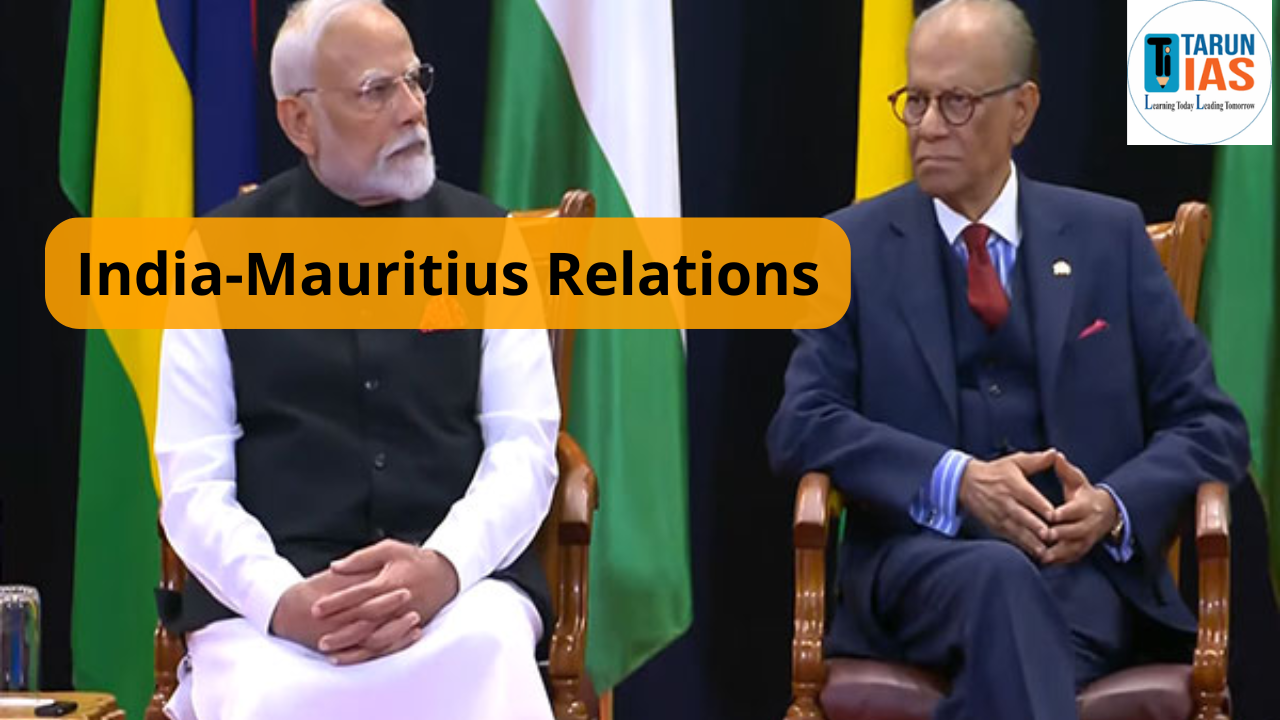India-Mauritius Relations Introduction
- Prime Minister Narendra Modi’s visit to Mauritius on March 11-12, 2025, for the country’s Independence Day celebrations, reaffirms the historical and strategic ties between the two nations.
- With the recently elected government of Navinchandra Ramgoolam, this visit will focus on deepening economic, security, and diplomatic cooperation.
- Mauritius holds a critical position in India’s Indian Ocean Region (IOR) strategy, serving as an economic hub and a security partner.

Historical Evolution of India-Mauritius Relations
-
- The India-Mauritius relationship is over 300 years old, rooted in shared cultural, historical, and political ties. The presence of a large Indian diaspora (nearly 70% of Mauritius’ 1.2 million population) makes this bond unique. India has played a key role in Mauritius’ independence, economic growth, and security infrastructure.
- Colonial Era & Early Connections (Pre-1947):
-
-
- Indian connections with Mauritius date back to the early 18th century, when Indian workers were brought as indentured laborers to work in sugarcane plantations under British rule.
- Mahatma Gandhi visited Mauritius in 1901, which ignited political consciousness among Indian-origin Mauritians. He advised the local Indian community to actively engage in political movements and advocate for their rights.
-
- Post-Independence Era (1947–1968):
-
-
- India was among the first countries to support Mauritius’ independence from British rule. Mauritius eventually gained independence on March 12, 1968.
- India has backed Mauritius’ sovereignty claim over the Chagos Archipelago, aligning with its decolonization policy and supporting Mauritius at the UN and ICJ (International Court of Justice).
-
- Strengthening Economic & Bilateral Investment Ties (1970s–2000s):
-
-
- The Double Taxation Avoidance Agreement (DTAA), signed in 1983, made Mauritius a preferred route for Foreign Direct Investment (FDI) into India.
- By 2024, Mauritius accounted for $175 billion in cumulative FDI inflows into India, making it the largest source of FDI.
- India helped establish the Mahatma Gandhi Institute (MGI) in 1976, which promotes Indian languages and cultural studies in Mauritius.
-
- Expanding Cooperation (2000–2010):
-
-
- India played a crucial role in Mauritius’ IT infrastructure by setting up the Cyber City Project in Ebene, which transformed Mauritius into a regional technology hub.
- India also donated patrol boats, including CGS Barracuda in 2015, to help Mauritius secure its Exclusive Economic Zone (EEZ), which spans 2.3 million square kilometers.
-
- Strategic & Economic Deepening (2011–2020):
-
-
- The DTAA was amended to prevent tax evasion and round-tripping of funds. Mauritius also joined India’s SAGAR initiative (Security and Growth for All in the Region).
- India extended financial assistance for Mauritius’ Metro Express Project and Social Housing Scheme.
-
- Recent Developments (2021-Present):
-
- In 2021, India signed the Comprehensive Economic Cooperation and Partnership Agreement (CECPA), the first-ever trade agreement between India and an African nation.
- In 2022, India assisted Mauritius in launching its first satellite, the MIR-SAT1, using ISRO’s PSLV-C51 rocket.
- In 2024, India revised the DTAA with Mauritius by incorporating the Principal Purpose Test (PPT) under OECD’s Base Erosion and Profit Shifting (BEPS) framework to prevent tax evasion and treaty abuse.
Why Is Mauritius Important for India?
- Geo-Political Significance:
-
-
- Key Player in India’s Indo-Pacific Strategy: Mauritius is a vital partner in IORA (Indian Ocean Rim Association) and is integrated into India’s Security and Growth for All in the Region (SAGAR) initiative.
- Backing Mauritius’ Sovereignty Claims: India has supported Mauritius’ legal battle at the UN and ICJ regarding the Chagos Archipelago dispute with the UK.
-

- Security & Strategic Significance:
-
- Maritime Surveillance: India installed a coastal radar system in Mauritius to monitor Chinese naval movements in the Indian Ocean. India is redeveloping Agaléga Island to establish airstrips and port facilities for joint surveillance
- Regional Security Cooperation: Mauritius is an active participant in the Colombo Security Conclave, working alongside India, Sri Lanka, Maldives, and Bangladesh on regional security, counter-terrorism, and disaster management.
- Naval Cooperation: India has deployed INS Sarvekshak for hydrographic surveys of Mauritius’ waters, helping map its maritime territory.
- Countering China’s Influence: China has increased its investments in Mauritius, funding infrastructure projects like highways and sports complexes, which poses a strategic challenge for India.
- Indian Diaspora & Cultural Ties:
-
-
- Historical & Cultural Ties: With nearly 70% of Mauritius’ population tracing their roots to India, the diaspora connection is a key pillar of bilateral relations. About 50% of Mauritians trace their ancestry to Bihar and Uttar Pradesh, with many still speaking Bhojpuri. Smaller Tamil, Telugu, and Marathi communities have also preserved their languages and traditions, making Mauritius a microcosm of India.
- OCI Privileges: India grants Overseas Citizenship of India (OCI) benefits to Mauritians of Indian ancestry up to seven generations, strengthening people-to-people ties.
- Education & Scholarships: India provides educational support through ITEC and ICCR scholarships, along with programs like Know India Programme (KIP).
-
- Geo-Economic Significance:
-
- Mauritius is India’s FDI Gateway: Over 39% of total FDI into India between 2000 and 2024 came via Mauritius, due to its favorable tax policies under the DTAA. However, post DTAA amendments in 2016, annual FDI inflows from Mauritius dropped from $15.72 billion (2016-17) to $6.13 billion (2022-23).
- A Bridge to Africa: Mauritius acts as a financial and trade hub for Indian businesses expanding into Francophone Africa. Bank of Baroda, State Bank of India (SBI), and ICICI Bank have strong operations in Mauritius.
Key Areas of Cooperation
- Cultural Relations and people-to-people ties:
-
- Cultural Collaboration: World Hindi Secretariat: Mauritius also hosts the World Hindi Secretariat, an India-Mauritius bilateral organization to promote Hindi globally, which was constructed with Indian funding and inaugurated during the visit of President Kovind in March 2018. In 1987, India established the Indira Gandhi Centre for Indian Culture (IGCIC), which is India’s largest cultural centre abroad. IGCIC holds classes in Hindustani music, Kathak, Tabla and Yoga for over 2,500 Mauritian students every year.
- Education: Mauritius is one of the largest beneficiaries of the Indian Technical and Economic Cooperation (ITEC) programme and receives about 400 training slots every year for various courses. Under the ICCR India-Africa Maitri Scholarship Scheme, 60 scholarships are extended this year to Mauritian students for pursuing higher education in India.
- Infrastructure & Development Cooperation:
- India has provided a Special Economic Package of $353 million, funding major infrastructure projects, including the Metro Express.
- A $500 million Line of Credit supports ten priority initiatives such as the National Archives, Mauritius Police Academy, and the establishment of the first overseas Jan Aushadhi Kendra to promote affordable healthcare.
- Military & Security Cooperation:
- Maritime Security: India has supplied patrol vessels like CGS Barracuda and CGS Victory to help Mauritius secure its Exclusive Economic Zone (EEZ). Mauritius also actively participates in India-led naval exercises such as VARUNA and MILAN.
- Oceanographic Surveys: The Indian Navy’s INS Sarvekshak has mapped 25,000 sq. km of Mauritius’ oceanic territory.
- Anti-Piracy & Regional Stability: India supports surveillance and intelligence-sharing through coastal radar networks and monitoring from Agaléga Island, enhancing maritime domain awareness.
- Economic Cooperation:
- Trade & Investment: India remains one of Mauritius’ largest trade partners, exporting petroleum products, pharmaceuticals, textiles, and food items.
- DTAA & CECPA: To address tax evasion and Base Erosion and Profit Shifting (BEPS) concerns, India revised the Double Taxation Avoidance Agreement (DTAA) in 2016. The Comprehensive Economic Cooperation and Partnership Agreement (CECPA) in 2021 further strengthened trade and investment flows.
- Financial & Business Collaboration: With a well-developed banking sector, Mauritius serves as a financial hub for Indian businesses. It has also adopted India’s Unified Payments Interface (UPI) to enable seamless, cashless transactions.
- Indian PSUs’ Role: Indian public sector units (PSUs) contribute significantly to banking, construction, telecommunications, and energy in Mauritius.
- Humanitarian Assistance & Disaster Response:
- COVID-19 Support: India has been Mauritius’ ‘First Responder’ in crises, including Covid-19 and the Wakashio oil spill. India provided 1 lakh free Covishield vaccines in 2021, along with additional doses. During the pandemic, 13 tonnes of medicines and an Indian medical team were sent in 2020.
- Wakashio Oil Spill (2020): India swiftly responded by sending 30 tonnes of technical equipment, a 10-member response team, and deploying INS Nireekshak for salvage operations.
Challenges in India-Mauritius Relations
- Trade Imbalance: Mauritius faces a substantial trade deficit with India. In 2023-24, India’s exports to Mauritius were $778 million, while Mauritius’ exports to India were only $73 million. This imbalance has led to concerns in Mauritius about the lack of access to the Indian market for its products, despite the Comprehensive Economic Cooperation and Partnership Agreement (CECPA) signed in 2021. Mauritius is particularly keen on expanding exports of sugar, textiles, and seafood, but limited competitive advantage and production capacity hinder its trade potential.
- Slow Execution of Infrastructure Projects: Several India-backed infrastructure projects in Mauritius have experienced delays due to bureaucratic hurdles, land acquisition challenges, and project execution issues. For instance, the Metro Express Project, funded under India’s $500 million Line of Credit, faced initial setbacks in land acquisition, environmental clearances, and technical planning. While the first phase was completed in 2020, subsequent phases have seen delays, affecting connectivity goals. Similarly, the new Supreme Court building, inaugurated in 2020 with Indian assistance, encountered construction delays due to logistical disruptions. Ensuring timely completion of such projects remains a critical challenge in deepening India-Mauritius development cooperation.
- Declining FDI: The amendments to the India-Mauritius Double Taxation Avoidance Agreement (DTAA) in 2016 have reduced Mauritius’ role as a key investment hub for India. Previously, a significant portion of Foreign Direct Investment (FDI) into India was routed through Mauritius due to its tax-friendly policies. However, after the amendments, investments from Mauritius have declined. According to the Reserve Bank of India (RBI), FDI inflows from Mauritius fell from $15.7 billion in 2016-17 to $6.1 billion in 2022-23, impacting the financial ties between the two nations.
- Chinese Influence: China has been expanding its footprint in Mauritius through large-scale infrastructure investments. The Jin Fei Smart City Project, a Chinese-funded industrial park, is a major example of Beijing’s growing presence. China has also provided concessional loans and grants for port development and road infrastructure, challenging India’s traditional influence in the region. Additionally, Mauritius joined China’s Belt and Road Initiative (BRI) in 2018, raising concerns in New Delhi about Beijing’s increasing strategic engagement.
- Chagos Dispute Complexity: The Chagos Archipelago dispute between Mauritius and the United Kingdom places India in a diplomatic dilemma. While India has historically supported Mauritius’ sovereignty claims over the islands, it has maintained a cautious approach due to its defense cooperation with the US and UK, both of whom have strategic interests in the Diego Garcia military base located in Chagos. Mauritius has expressed dissatisfaction with India’s measured stance, particularly after India abstained from a crucial 2019 UN General Assembly vote that called for the UK to return Chagos to Mauritius.
- Maritime Security & Drug Trafficking: The Indian Ocean Region (IOR) faces increasing threats from drug trafficking, illegal fishing, and transnational crimes. Mauritius has emerged as a transit hub for drug networks operating between Africa, South Asia, and Southeast Asia. In 2023, Mauritian authorities seized over 240 kg of heroin and synthetic drugs, the largest drug bust in the country’s history, highlighting the growing narcotics trade in the region. Given India’s strategic maritime interests, such security concerns necessitate stronger cooperation in coastal surveillance, intelligence sharing, and naval patrols to curb illicit activities.
Way Forward for Strengthening India-Mauritius Relations
- Advanced Economic & Trade Partnerships: To boost FDI and trade, India should consider revising the Double Taxation Avoidance Agreement (DTAA), similar to how the India-UAE Comprehensive Economic Partnership Agreement (CEPA) enhanced investment flows. Expanding the Comprehensive Economic Cooperation and Partnership Agreement (CECPA) to cover IT, fintech, and renewable energy—modeled after the India-Singapore CECA—can further diversify trade and attract investment. Mauritius’ participation in SADC, COMESA, and AfCFTA offers India access to larger African markets, a strategic advantage for Indian businesses.
- Strengthening Diaspora & Cultural Engagement: With nearly 68% of Mauritius’ population of Indian origin, reinforcing cultural and academic exchanges is key. Institutions like the Mahatma Gandhi Institute and the World Hindi Secretariat can be expanded for language and cultural preservation, following successful models in Fiji and Trinidad. Hosting business forums, academic exchanges, and Pravasi Bharatiya Divas-style summits can engage the Indian diaspora in Mauritius, strengthening people-to-people ties.
- Maritime Security & Strategic Cooperation: Enhancing maritime domain awareness through coastal radar networks, joint naval drills, and intelligence sharing is crucial to counter piracy, illegal fishing, and drug trafficking in the Indian Ocean Region (IOR). India can adopt a model similar to the White Shipping Agreement with France for real-time maritime data exchange. Additionally, expanding the Colombo Security Conclave (CSC)—currently involving India, Sri Lanka, and the Maldives—to include Mauritius would strengthen regional maritime cooperation.
- Countering Chinese Influence with Strategic Diplomacy: China’s growing presence in Mauritius, through infrastructure projects and financial investments, poses a challenge for India. To maintain its influence, India should increase development grants, offer concessional loans, and expand technology partnerships, mirroring its successful diplomatic approach in the Maldives. Establishing a framework like the India-Japan Annual Summit, with regular high-level engagements, can ensure sustained diplomatic collaboration.
- Innovation-Driven Development & Skill Building: Mauritius is emerging as a fintech and digital economy hub. India should strengthen skill development programs and educational exchanges, taking inspiration from the India-UAE Skill Development MoU. Expanding fintech and digital payment integration—such as India’s Unified Payments Interface (UPI), which is already set for launch in Mauritius—will further enhance bilateral financial cooperation.
- A Long-Term Strategic Vision: India and Mauritius should adopt a 25-year roadmap for strategic cooperation, similar to the India-UAE Vision 2030, focusing on areas like infrastructure, trade, technology, and climate resilience. Additionally, applying the India-Singapore Smart City Collaboration model to Mauritius can drive sustainable urban development, supporting its transition into a modern economic hub.















